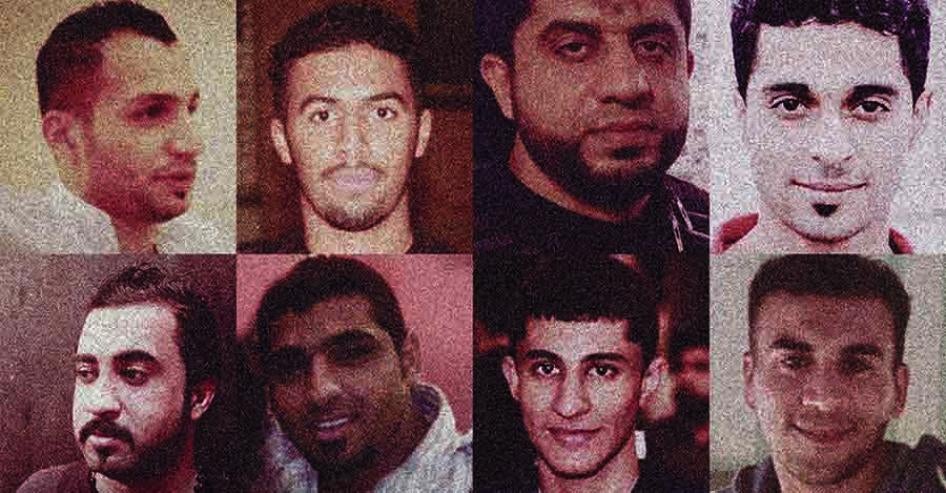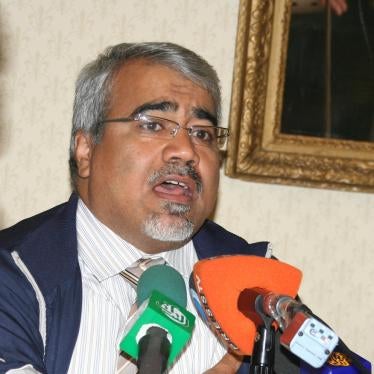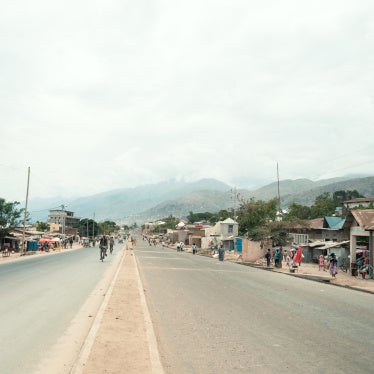(Beirut) – Bahraini courts have convicted and sentenced defendants to death following manifestly unfair trials, based solely or primarily on confessions allegedly coerced through torture and ill-treatment, Human Rights Watch and the Bahrain Institute for Rights and Democracy said in a joint report released today.
The 61-page report, “‘The Court is Satisfied with the Confession’: Bahrain Death Sentences Follow Torture, Sham Trials,” based primarily on court records and other official documents, found serious and persistent human rights violations underlying the convictions and death sentences of cases of eight men examined for the report. The men are among 26 who are currently on death row, their appeals exhausted. Trial and appeal courts cavalierly dismissed credible allegations of torture and ill-treatment during interrogation instead of investigating them, as required by international and Bahraini law. The courts routinely violated defendants’ rights to fair trials, including the right to legal counsel during interrogation, the right to cross-examine prosecution witnesses, and through reliance on secretly sourced reports.
“Bahraini officials routinely proclaim that the government respects fundamental human rights, but in case after case, courts relied on coerced confessions despite defendants’ credible claims of torture and ill-treatment,” said Michael Page, deputy Middle East director at Human Rights Watch. “The many human rights violations that underlie these death sentences reflect not a justice system but a pattern of injustice.”
Bahrain has executed six people since 2017, when the country ended a de facto seven-year moratorium on the death penalty. The 26 men now on death row can be executed once King Hamad bin Isa Al Khalifa ratifies their sentences.
Each of the eight defendants credibly alleged that their confessions were extracted through torture and ill-treatment. The prosecution and courts failed to investigate these allegations, which in some cases were supported by the findings of physicians. Yet courts summarily concluded that no ill-treatment or abuse had occurred in summary rulings replete with inconsistencies and in some cases contradicted by undisputed evidence.
The Bahraini courts also consistently violated fundamental due process and fair trial rights during the prosecutions. It appears that none of the defendants were allowed to have counsel during interrogations. In at least two cases, defendants were not given access to prosecution evidence used at trial, including, in one instance, a report that relied on secret sources whom the defense could not cross-examine. In another case, the court did not allow the accused to present defense witnesses.
“It is particularly appalling to sentence people to death amid torture allegations and after manifestly unfair trials,” said Joshua Colangelo-Bryan, a Human Rights Watch consultant and primary author of the report. “King Hamad should commute all death sentences immediately and the government should reinstate the de-facto moratorium on executions.”
One of the cases involves Zuhair Ebrahim Jasim Abdullah, whom police arrested for his purported involvement in the killing of a police officer. He alleged that interrogators removed all his clothes in an ultimately-aborted attempt to rape him and later threatened to rape his wife. He also alleged that officers used electric shocks on his chest and genitals. Eventually, Abdullah confessed falsely.
In April 2018, Abdullah filed a complaint alleging torture with the Interior Ministry’s Ombudsman office and Special Investigations Unit. Abdullah argued during his trial that coercion invalidated his confession and that the case should be suspended pending the results of the investigations. The court denied this request and dismissed the torture allegations, writing in its verdict that it was, “assured of the validity and seriousness of [the] investigations.” In November 2018, the court convicted Abdullah and sentenced him to death based on his “confession.”
Abdullah again raised his claim of coercion on appeal. Instead of ordering an investigation into the allegations, the appellate court summarily found that the “verdict ensured a justified and proper response” to those arguments. The appellate court further concluded it had been proper not to adjourn the case because Abdullah’s complaints were “still under investigation” – the very reason why the case should have been stayed. The Court of Cassation affirmed the conviction and sentence in June 2020.
Abdullah’s case, as well as the others examined, illustrate how Bahraini courts violated their obligations under international and Bahraini law to investigate abuses and respect fundamental fair trial rights. In some cases, prosecutors appeared to be complicit in these violations.
The systematic nature of the defendants’ serious abuse allegations is underscored by the similarities among the cases, Human Rights Watch and the Bahrain Institute for Rights and Democracy said. Much of the torture and ill-treatment allegedly occurred in the same two locations: the Criminal Investigation Directorate of the Interior Ministry and the Royal Academy of Policing, located adjacent to Bahrain’s Jau Prison. There also are similarities in the methods of torture and ill-treatment the eight defendants described.
In addition, three of the 26 people on death row were convicted on drug-related charges, despite Bahrain’s claim that it “applie[s death sentences] solely as a penalty for extremely serious offenses, such as premeditated murder.”
King Hamad should commute all outstanding death sentences, starting with defendants convicted on the basis of allegedly coerced confessions and those who have been sentenced to death for other than the most serious crimes, Human Rights Watch and the Bahrain Institute for Rights and Democracy said. Bahrain should officially reinstate the de facto moratorium on judicial executions and take steps to formally end the application of the death penalty in all circumstances. The king should also establish an independent commission to investigate and report publicly on violations of the prohibition of torture by security and judicial officials.
The governments of the United States and the United Kingdom as well as the European Union and its member states should urge Bahrain through both public and diplomatic channels to halt all executions and seriously investigate torture allegations and violations of the right to a fair trial.
“The findings in this report have devastating implications for death row inmates in Bahrain,” said Sayed Ahmed Alwadaei, advocacy director at the Bahrain Institute for Rights and Democracy. “Bahrain's allies in particular the US and UK should take decisive steps to stand with these victims before it is too late.”









